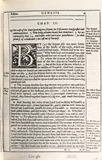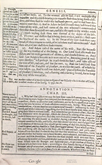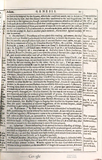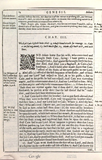By the craft of the Devil speaking in a serpent, our first parents transgressed God’s commandment. (7) Who being ashamed would hide themselves: (9) but are reproved by God. (14) And besides other particular punishments (yet with promise of a Redeemer) are cast out of Paradise.
BUT [a] the serpent also was more subtle then all the beasts of the earth, which our Lord God had made. Which said to the woman: • Why hath God commanded you, that you should not eat of every tree of Paradise? 2To whom the woman answered: Of the fruit of the trees that are in Paradise, we do eat: 3but of the fruit of the tree which is in the middle of paradise, God hath commanded us that we should not eat: and that we should not touch it, lest perhaps we die. 4And the serpent said to the woman: No you shall not die the death. 5For God doth know that in what day soever you shall eat thereof, your eyes shall be opened: and you shall be as Gods, knowing good and evil.
6The woman therefore saw that the tree was good to eat, and fair to the eyes, and delectable to behold: and she took of the fruit thereof, and did eat, and gave to her husband, who did eat. 7And the eyes of them both were opened: and when they [b] perceived themselves to be naked, they sowed together leaves of a fig-tree, and made themselves aprons.
8And hearing the voice of our Lord God walking in Paradise at the afternoon air, Adam hid himself and so did his wife from the face of our Lord God, amidst the trees of Paradise. 9And our Lord God called Adam, and said to him: Where art thou? 10Who said: I heard thy voice in Paradise: and I feared, because I was naked, and I hid me. 11To whom he said: And who hath told you thee that thou wast naked, but that thou hast eaten of the tree, whereof I commanded thee that thou shouldest not eat? 12And Adam said: The woman, which thou gave me to be my fellow-companion, gave me of the tree, and I did eat.
13And our Lord God said to the woman: Why hast thou done this? Who answered: The serpent deceived me, and I did eat. 14And our Lord God said to the serpent: Because thou hast done this thing, [c] accursed art thou among all cattle, and beasts of the earth: upon thy breast shalt thou go, and [d] earth shalt thou eat all the days of thy life. 15I will put enmities between thee and the woman, and thy seed and the seed of her: • she shall bruise thy head in pieces, and thou shalt lie in wait [e] of her heel. 16To the woman also he said: I will multiply thy travails and thy child-bearings: in travail shalt thou bring forth children, and thou shalt be under your husband’s power, and he shall have dominion over thee. 17And to Adam he said: Because thou hast heard the voice of thy wife, and hast eaten of the tree, whereof I commanded you that you shouldest not eat, cursed is the earth in thy work: with [f] much toiling shalt thou eat thereof all the days of thy life. 18Thorns and thistles shall it bring forth to the, and thou shall eat the herbs of the earth. 19In the sweat of thy face shalt thou eat bread, till thou return to earth, of which thou wast taken: because • dust thou art, and into dust thou shalt return.
20And Adam called the name of his wife, Eve: for because [g] she was mother of all the living. 21Our Lord God also made for Adam and his wife garments of skins, and clothed them: 22And said: Lo Adam is become as it were one of us, knowing good and evil: now therefore • lest perhaps he reach forth his hand, and take also of the tree of life, and eat, and live for ever. 23And our Lord God sent him out of the Paradise of pleasure, to work the earth of which he was taken. 24And he cast out Adam, and • placed before the paradise of pleasure Cherubins, and a flaming and a turning sword, for to keep the way of the tree of life.
ANNOTATIONS. CHAP. 3.
1. Why has God?.) Here we may see how sin came first amongst men. For the devil envying man’s happy state tempted Eve the weaker person, beginning with a question, thereby to allure her into conference, and by such a question as might bring her into suspicion of God’s affection towards man, saying: Why hath God commanded you, that you should not eat of every tree of Paradise? insinuating by these words, and withal internally suggesting, that God dealt hardly with them, abridging their liberty without cause. And when he had got so much of her, that she was displeased with the precept, which she showed by adding of her own (to make it seem more grievous) that they were forbidden to touch the tree, and again by reporting the punishment as doubtful, saying: Lest perhaps we die; then the tempter avouched boldly, and falsely, that they should not die, and charged God to be envious of the benefit they should get by eating of that tree, saying their eyes should be opened, and they should be as Gods, knowing good and evil. Upon which persuasion, and liking also she had to the fruit, she did take and eat, and persuaded Adam also to eat. And forthwith they saw that they would not have seen, knew evil which they had better not to have known, were ashamed, and endeavoured to cover and hide themselves. Even thus the devil deals with men ever since, assaulting the weaker persons, and weaker part, as the flesh and sensuality, and by them setteth upon the stronger and superior part, to get consent of free will, without which there is no sin; according to that famous saying of St. Augustin: Pecatum adeo est voluntarium, ut nullo modo sit peccatum, si non voluntarium. Sin is so voluntary, that in no wise it can be sin, if it be not voluntary. Wherefore it was no sin in Eve to be tempted by the serpent, which she could not avoid, nor in Adam to be tempted by Eve, but they sinned when they consented to the evil suggestions. And now in the regenerate, though concupiscence remain, which is the effect of sin past, and occasion of sin in those that yield again to temptations, yet is it not sin, but punishment of sin, and matter of exercise in the just, and if we resist, of merit: and therefore St. Paul exhorts us, to walk in the spirit, and the lusts of the flesh we shall not accomplish. And in another place showeth, that he which fights lawfully, shall be crowned.
15. She shall bruise.) Protestants will not admit this reading, ipsa conterets, she shall bruise, lest our Blessed Lady should be said any way to bruise the serpent’s head. And Kemnisius amongst others saith, that all ancient Fathers read, ipsum, not, ipsa. But he is convinced of lying by Claudius Marius Victor, lib. 1. in Gen., Alcimus Auitus lib. 3. carm. ch. 6., St. Chrysostom, hom. 17. in Genes., St. Ambrose lib de fuga saeculi cap. 7., St. Augustin, li. 2. de Genesi contra Manichaeos, cap. 18. & lib. 11. de Genesi ad literam chap. 26., St. Gregory, lib. 1. Moralium cap. 38. And after them St. Bede, Eucherius, Rabanus, Rupertus, Strabus, and Lyra upon this place, St. Bernard, ser 2. super Missus est. And many others, who read ipsa as the Latin text now hath.
But whether we read, She shall bruise, or, her seed, that is her son Christ, shall bruise the serpent’s head, we attribute no more, nor no less to Christ nor to our Lady by the one reading, than by the other: for by the text, I will put enmities between thee and the woman, between thy seed and her seed, it is clear, that this enmity and battle pertained to the woman and her seed on the one party, and to this devil, that spoke by the serpent, and all the wicked, on the other party, and that the victory should happen to mankind. Which being captive by Adam’s sin, occasioned by a woman, should be redeemed, both sexes, though in far different sort, concurring thereto. And so it is most true, that Christ by his own proper power, and his Blessed Mother by her most immediate cooperating to his Incarnation (and consequently to other Mysteries) did bruise the serpent’s head, break and vanquish his power. * As many ancient Fathers do excellently discourse: namely St. Bernard, writing upon these words in the Apocalypse ch. 12, A great sign appeared in heaven, a woman clothed with the sun: Even though (saith he) by one man and one woman we were greatly damaged, yet (God be thanked) by one man and one woman all losses are repaired, and that not without great increase of graces. For the benefit does far exceed the loss. Our merciful father giving us for a terrestrial Adam Christ our Redeemer, and for old Eve God’s own Mother. † Moreover as the same St. Bernard showeth, this blessed Virgin in singular sort bruised the serpent’s head, in that she quite vanquished all manner suggestions of the wicked serpent, never yielding to, nor taking delight in any evil moved by him.
19. Dust you are.) By these words Adam was admonished to humble himself, considering the matter whereof his body was made, and into which he should be resolved again. * Whereupon it came to be a ceremony amongst penitents, to cast ashes on their heads, as appeareth in holy Scriptures. For which cause the Church now also useth this ceremony the first day of Lent, putting ashes on her children’s heads: willing them to remember, that dust they are, and to dust they shall return, to move us by this meditation to more serious penance.
22. Lest perhaps.) Notwithstanding God’s eternal decree in disposing all things, and his omnipotence which nothing can resist, yet he produceth good, and either avoideth or disposeth of evil which he suffereth, by ordinary means, as appeareth Act. 27:31, and that because man hath free-will, with which God concurreth, and destroyeth not nor forceth, as St. Augustin teacheth.
24. Placed Cherubins.) Man being cast out of Paradise, the same is defended with double guard: with Angels, that are watchful, wise, and potent; and with fire and sword, most terrible armour to man. Whereby again we see that God useth ordinary means in his providence, as the ministry of Angels and human terror, and would neither destroy the tree, nor deprive it of the virtue to prolong life, nor bereave man of free-will, by which he might desire to return: but conserving nature in all creatures, preventeth inconveniences otherwise.
These Angels also hinder the devil, that he can not enter Paradise, lest he should take of the fruit of the tree, and give it to men to prolong their lives, and thereby draw them to his service.
Footnotes
- ^ Serpents most crafty to escape harm when they hurt men: so is the devil.
- ^ After sin they were ashamed, not before, St. Chrisost.
- ^ All this curse pertaineth to the devil that spoke in the serpent, St. Aug. lib. 2. de Gen. ad lit. ch. 36. St. Beda in hunc locum.
- ^ Earthly or worldly carnal men, St. Greg. in Psal. 101.
- ^ Though good men resist temptations at the first assaults and so bruise the serpents head, yet he endeavoureth still to deceive especially in the end of man’s life, signified by the heel, St. Greg. in cap. 1. Job.
- ^ All men travel one way or other: and such as suffer weeds to overgrow (in their souls, shall after this life either sustain the fire of Purgatory, or eternal pain, St. Aug. lib. 2. ch. 20. de Gen. con. Man.
- ^ She was mother rather of all the dying: but in figure of our Bl. Lady who is mother of Christ, life itself, she is called mother of the living. St. Epiph. her. 78.
Margin Notes
- into. The second part. Of the fall of man, and propagation of man and of sin.
- annot. 1. why hath God.
- Sin entered among men by the envy and craft of the devil, man consenting to his suggestions.
- Eve first sinned in thought, then in words, last in deeds.
- Bad sequels of sin.
- No sin can be without free will.
- Concupiscence no sin, but the effect and occasion of sin.
- Also occasion of merit.
- annot. 15. she shall bruise.
- The Latin text defended against Kemnisius and other Protestants.
- See Card. Bellarm lib. 2. ch. 12. de verbo Dei.
- Both readings yield the same sense.
- As Adam, was the cause, and Eve an occasion of mans captivity: so Christ is the true cause and his Mother an occasion of our restoration.
- Our Bl. Lady resisted all evil suggestions.
- annot. 19. dust you are. The ceremony of ashes, on Ash Wednesday.
- annot. 22. lest perhaps. God’s providence concurreth with man’s free will.
- annot. 24. placed cherubins.
- Paradise defended by Angels and by fire and sword.
- God destroyeth not nature.
- Good Angels hinder devils of their desires.
Margin References
- 4. 2. Cor. 14.
- 6. Eccl. 25. 1. Tim. 2, 14.
- 16. 1. Cor. 14.
- annot. 1. why hath God.
- Sap. 2, 24.
- Joh. 8, 44.
- St. Aug. lib. 14. de civit. ch. 11.
- Rupert. lib. de Trinit. & operibus eius, ch. 4.
- Lib. de vera Religione ch. 14.
- Lib. 1. Retract. ch. 13.
- St. Aug. lib. 1. de nupt. & conc. ch. 23.
- Gal. 5.
- 2. Tim 2.
- annot. 15. she shall bruise. *
- Ire. lib. 3. ch. 33. & lib. 5. circa med.
- St. Epip. Haer. 78.
- St. Jerom. ep. 22 ad Eustoch.
- St. Aug. (or S Fulgent) ser. 18. de Sanctis. de fide & Sym. de Agone Christiano.
- annot. 15. she shall bruise. † Ser. 2. super. Missus est.
- annot. 19. dust thou art. *
- Job 42.
- Esai. 58.
- Jere. 6.
- Jona 3.
- Mat. 11.
- annot. 22. lest perhaps. de grat. & li. arb. ch. 6. de corrept. & grat. ad art. falso impos.
- annot. 24. placed cherubims. St. Aug lib. 11. de Gen. ad lit ch. 40.




